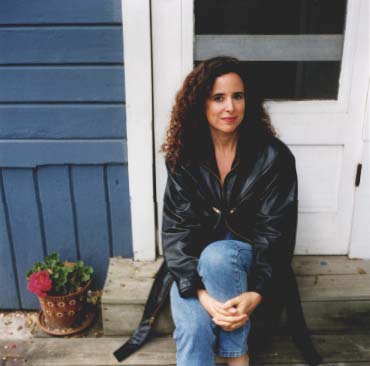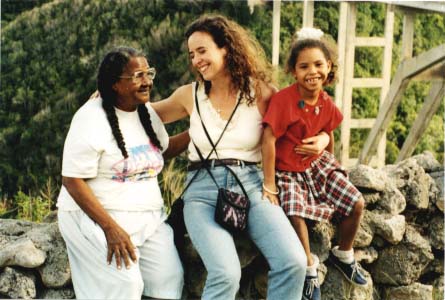 RUTH BEHAR was born in Havana, Cuba and came to live in New York with her family in 1962.
RUTH BEHAR was born in Havana, Cuba and came to live in New York with her family in 1962.
She received her B.A. in Letters (1977) from Wesleyan University, and her M.A. (1980) and Ph.D. in Cultural Anthropology (1983) from Princeton University.
She resides in Ann Arbor and is Professor of Anthropology at the University of Michigan. She is also affiliated with University of Michigan programs in Women's Studies, Latina/Latino Studies, and Latin American and Caribbean Studies.
Since her youth, Ruth Behar has had a strong attachment to the Spanish-speaking world. During the past twenty years she has traveled numerous times to Spain, Mexico, and Cuba. She has written about her experience of crossing cultural borders as a poet, essayist, fiction writer, editor, and ethnographer. She is now turning to documentary filmmaking to seek yet another expression of her unique vision of the meaning of home in an age of travel and homesickness.

In 1988, at the start of her career as an anthropologist, Ruth Behar was awarded a MacArthur Foundation "genius" award. She has since been the recipient of many prestigious fellowships for her scholarly and artistic work. These include a John Simon Guggenheim award in 1995 and a Creative Artist Grant from the Michigan Council for Arts and Cultural Affairs in 1998.
She received the Distinguished Alumna Award in Recognition of Outstanding Achievement and Service from Wesleyan University in 1997. Latina Magazine, in 1999, named her one of the 50 Latinas who made history in the twentieth century.
Ruth Behar's first book was The Presence of the Past in a Spanish Village: Santa María del Monte (Princeton, 1986; expanded paperback edition, 1991), the story of how a small village negotiated its relation to the past in the wake of social transformations that removed people from the land during the late Franco years.
Her second book, Translated Woman: Crossing the Border with Esperanza's Story (Beacon Press, 1993), an account of her friendship with a Mexican street peddler, gained her national prominence. Translated Woman was named a Notable Book of the Year for 1993 by the New York Times. The book was adapted for the stage by PREGONES Theater, a Latino company based in New York, which has taken the production to university campuses as well as to The Painted Bride Theater in Philadelphia and to their own theater in the Bronx.
Ruth Behar's most recent book, The Vulnerable Observer: Anthropology That Breaks Your Heart (Beacon Press, 1996), is a controversial and widely discussed collection of six personal essays that places the emotions of loss, mourning, and the search for home at the center of anthropology and all acts of witnessing.
As a Cuban woman of the diaspora, Ruth Behar is committed to seeking reconciliation and a common culture and memory with Cubans on the island. In that spirit, she edited Bridges to Cuba/Puentes a Cuba (University of Michigan Press, 1995). The anthology paved the way for more interchanges and became a highly praised forum for the voices and visions of Cubans on the island and in the diaspora. She recently wrote the Foreword to the anthology Cubana: Contemporary Fiction by Cuban Women (Beacon Press, 1998).
While working to expand dialogue among Cubans, Ruth Behar also sought to bring scholarly attention to the creative writings of American women anthropologists. With feminist scholar Deborah Gordon, she co-edited Women Writing Culture (University of California Press, 1995), an anthology of creative and critical writings that has become a required book in discussions of the history of anthropology.
A respected, visible, and provocative scholar, Ruth Behar has also gained recognition for her literary essays, poetry, fiction, and new work as an emerging filmmaker. She is often invited both to lecture and to perform at universities, bookstores, and cultural institutions. Recent invitations have come from the Getty Center, the Cambridge Multicultural Arts Center, Harvard University, Tulane University, and Hebrew University in Jerusalem.
Her personal essays have been published in a range of anthologies. These essays include "The Body in the Woman, the Story in the Woman" (in The Female Body: Figures, Styles, Speculations, University of Michigan Press, 1991); "No Returns" (in Her Face in the Mirror: Jewish Women on Mothers and Daughters, Beacon Press, 1994); "The Story of Ruth, the Anthropologist" (in People of the Book: Thirty Scholars Reflect on Their Jewish Identity, University of Wisconsin Press, 1996); and "Juban América" (in King David's Harp: Autobiographical Essays by Jewish Latin American Writers, University of New Mexico Press, 1999).
Joyce Carol Oates chose Ruth Behar's short story "La Cortada" for inclusion in her anthology, Telling Stories: An Anthology for Writers (Norton, 1997), a text used widely in creative writing courses. Marjorie Agosín chose Ruth Behar's stort story "In the Absence of Love" for her anthology, The House of Memory: Stories by Jewish Women Writers of Latin America (The Feminist Press, 1999).
Ruth Behar's poems have appeared in Witness, Michigan Quarterly Review, Tikkun, Latino Stuff Review, Brújula, Prairie Schooner, The American Voice, and Bridges, as well as in the anthologies Sephardic American Voices: Two Hundred Years of a Literary Legacy (Brandeis University Press, 1996), Little Havana Blues: A Cuban-American Literature Anthology (Arte Público Press, 1996), and The Prairie Schooner Anthology of Jewish-American Writers, edited by Hilda Raz (Lincoln: University of Nebraska Press, 1998).
In the last ten years, Ruth Behar has traveled to Cuba frequently, seeking personal, spiritual, and intellectual connections with the country of her birth. Her return visits to the island have inspired an outpouring of artistic work.
A bilingual chapbook of her poems, Poemas que vuelven a Cuba/Poems Returned to Cuba (1995) was published in Matanzas, Cuba by Vigía, an editorial collective that produces handmade artisanal books in small editions. She recently completed a collection of prose poems, Everything I Kept/Todo lo que guardé, which explores the themes of loss and regret. This collection will soon be published in Cuba.
The latest progression of her work as an ethnographer and storyteller of women's lives has led Ruth Behar to the novel. She is currently writing Nightgowns from Cuba, a work that combines fiction, autobiography, and anthropological and historical research to tell the story of her Jewish-Cuban family's journey from Europe to Cuba to the United States as seen through the eyes of the Afro-Cuban woman, still living on the island, who was her caretaker as a child.
As an emerging filmmaker, Ruth Behar is bringing her humanistic, poetic, and strongly personal vision of cultural anthropology to the art of the documentary film. She is the director and producer of Adio Kerida/Goodbye Dear Love: A Cuban Sephardic Journey, a feature-length film about the search for identity and memory among Sephardic Cuban Jews living in Cuba, Miami, and New York. She expects to complete Adio Kerida in the summer of 2001.
Articles in the media by Ruth Behar:
12/4/92, Chronicle of Higher Education, Point of View, "Arroz con MacArthur."
12/18/92, New York Times Op-Ed, "A Bridge to Cuba."
6/29/94, Chronicle of Higher Education, "Dare We Say 'I'?"
10/31/95, New York Times, Op-Ed, "The Power Mask."
11/21/97, Chronicle of Higher Education, "What 15 Top Anthropologists are Working on Now."
1/22/98, Los Angeles Times, Commentary, Perspective on Cuba: "The Wait Bears Fruit; What of Hope?"
3/2/98, Los Angeles Times, Commentary, Cuba, "Home Is Where the Heart Is and Where the Soul Finds Its Spirit."
2/21/99 "Dialogue among Jews will be challenge," Ann Arbor News.
Feature Articles about Ruth Behar
"In Bridges, Author Finds Understanding," by Liz Balmaseda, Miami Herald, 5/4/94.
"Quiero Las Dos Orillas," by Sahily Tabares, Bohemia, Havana, Cuba, 1996, page B60.
"Letting It Get To You: Cuban-born anthropologist Ruth Behar lives and works in a diaspora within a diaspora," by Judith Bolton-Fasman, Jerusalem Report, 5/1/97, pages 48-49.
"Ruth Behar," by Marjorie Agosín, ed., in Uncertain Travelers: Conversations with Jewish Women Immigrants to America, (University of Mexico Press, 1999).
"Metered Keys to a Rich Tradition," by Rahel Musleah, in Hadassah Magazine, August/September 2000, pages 31-33.